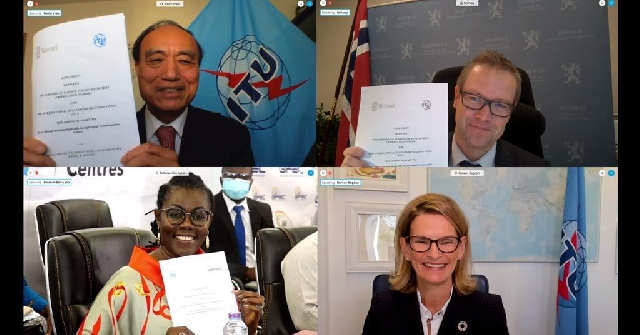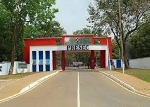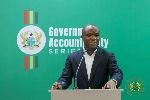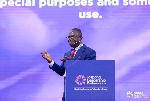Ghana secures $3m to boost digital skills – Ursula
 Ghana secures $3million facility from the ITU to boost digital skills across the country
Ghana secures $3million facility from the ITU to boost digital skills across the country
Ghana has secured a $3-million facility from the International Telecommunication Union (ITU) to boost digital skills across the country.
Communication Minister Ursula Owusu-Ekuful made the announcement on Thursday, 11 November 2020 at the signing of an agreement between ITU, the Norwegian Government; and the Government of Ghana, to support the Digital Transformation Centres (DTC) Initiative in the country.
The new partnership is expected to scale-up and strengthen digital skills training for underserved communities in Ghana, in collaboration with Cisco and the Ghana Investment Fund for Electronic Communications (GIFEC).
It will provide around 14,000 citizens with job-ready digital skills, in particular, women entrepreneurs, pupils, teachers, and marginalised groups, through 200 centres across the country.
Launched by ITU in partnership with Cisco and its Country Digital Acceleration Programme and Cisco Networking Academy in 2019, the Digital Transformation Centres (DTC) Initiative is operational in nine countries in Africa, Asia-Pacific, and Latin America.
Its main goal is to support countries to equip people with the skills needed to effectively participate in today's digital society and economy.
Speaking at the virtual event, Mrs Owusu-Ekuful touted the initiatives of the Akufo-Addo government that have facilitated ICT infrastructure development as well as the provision of equipment, and capacity-building programmes over the past 3 years, which have made a positive impact on the lives of individuals and institutions across Ghana.
Since 2017, she said the Ministry of Communication, through the Ghana Investment Fund for Electronic Communications (GIFEC), provided telecommunication connectivity to over 2,000 communities, as part of the flagship Rural Telephony Project, enhancing the socio-economic lives of over 1,200,000 citizens in rural Ghana.
“We are in the process of expanding access to an additional 2016 communities to connect some 3 million people, thereby providing 95% of our population with voice and data connectivity within the next 18 months. That is some of the use we are putting our universal access fund to and have secured a credit facility to finance this project upfront,” Mrs Owusu-Ekuful said.
Leaving no one behind
According to Mrs Owusu-Ekuful, the government is scaling up efforts to ensure that the developments are experienced in every part of the country, assuring that “we are leaving no one behind.”
In the government’s effort to guarantee the effective use of the equipment deployed in underserved and unserved communities, the Communication Minister further noted that: “We are building the capacity of persons in the formal and informal sector, as well as teachers and students.”
Over the past four years, a total of 502,600 persons have been trained in ICT programmes including 182,000 children trained to provide solutions to social problems through the Coding for Kids project.
In spite of Ghana’s steady development in ICT over the years, Mrs Owusu-Ekuful said it is evident that the ICT industry is male-dominated and that the government recognised the need to bridge the gender-digital divide, especially in underserved communities.
To achieve that, she said the government has instituted the ICT Skills for Entrepreneurial and Women Empowerment project, in collaboration with UNESCO, to provide ICT for women and girls in the informal sector.
So far, 400 women have been trained in Asumura, Goaso, Berekum, and Asankrangwa.
In addition to this, over 3,500 girls have been trained in Coding and Basic ICT, as part of the Girls in ICT initiative – an ITU programme, which seeks to arouse the interest of girls in the subject of ICT.
“It is, thus, relieving for the International Telecommunications Union (ITU), to include Ghana in the Digital Transformation Centres (DTC) programme, which will, in the long run, develop digital skills for citizens mainly at the basic and intermediate level,” the Minister
Source: classfmonline.com
Trending News

MoH orders investigation into Fourth Estate report on Ridge Hospital
14:32
PRESEC condemns labelling school as breeding ground for homosexuals
11:57
Diaspora Affairs Office partners World Vision to launch Diaspora National Service project
12:20
Police arrest six in Juaso robbery and gang rape case
13:29
Transport Ministry to engage GPRTU on reports of artificial vehicle shortages
15:30
Government to convert Kotoka Airport Terminal 2 into multipurpose facility to ease congestion
14:26
Dr. Siaw Agyepong urges deliberate leadership cultivation at 2026 JLC Conference
15:30
Razak Kojo Opoku accuses Walewale MP of misleading public over Bawa-Rock Company
06:42
Ken Ofori-Atta still at caroline detention centre – Legal team
14:26
Bawumia garners overwhelming delegate support in Ashanti Region
11:47



